advertisement
This post with strategies for parents to help struggling readers is one that I originally wrote in 2012, although these are still solid strategies today.
In this post, I shared about the strategies we used to help our 2nd grade struggling reader to grow into a voracious reader by the time he was in 6th grade. At the end of the post, I’ll share an update of where he is now that he’s midway through his junior year of high school.
advertisement
Struggling reader, reluctant reader, whatever you call it – our oldest son (who has Asperger’s Syndrome and ADHD) definitely had an extremely difficult time reading when he was younger. When he left school after second grade to start being homeschooled, they told me that he was just barely at grade level. Of course, what this meant was that he was just barely at a second grade level when he was at the end of second grade.
Even once he came home for school, he was still a struggling reader. During one of his case conference meetings (as we have decided to keep his IEP up-to-date with the school system), we requested that he be tested for a reading disability.
The school ended up saying that he did not have a reading disability, but the reasoning was odd and too long to go into here. We were secretly told by someone on the committee to have him tested again later, as she felt the results were not accurate and she was upset about the reasons they gave.
But, here we are today, and while he may not be the most amazing reader in sixth grade, he loves to read and reads well, particularly given his difficulty with reading in the past.
What We Did: 10 Strategies for Parents to Help Struggling Readers
1. Encouragement to Read Whatever He Wanted.
Sure, we have from time to time said he shouldn’t read something. But, back in the day when he was hardly reading, if he wanted to read Pokemon books for school, we would let him.
2. Have a Variety of Types of Reading Materials Available.
We didn’t stick to only books, but also magazines, comics, and Internet reading.
For working on reading during school time, we used the Hooked on Phonics Master Reader program, which we found a lot of success with.
3. Have High Interest Reading Materials Available.
Based on his preferences, we made sure to have a lot of things around the house that he would love to read. This is one reason, for instance, that we have a ton of ZooBooks Magazines around now.
4. Nightly Read Alouds.
One way to encourage children in their reading is to do a lot of read alouds. We haven’t always been good about doing it every night, but we definitely used to every night while he was still struggling so badly. We picked wonderful, classic books as well as silly books that were a little more on the side of twaddle. We just wanted to present reading to be the fun activity that it is.
5. Read School Materials Aloud.
In subjects where it didn’t matter if he was able to read on his own, I would usually read things aloud to him. As he got better with reading, I would sometimes ask him to tackle one paragraph. As he got even better, I might ask him to read a whole page. I knew that he was getting even more comfortable with reading when he would excitedly ask me if he could be the one to read to me.
6. Have Your Struggling Reader Be the Teacher.
In order to help him feel more successful, I would sometimes ask him to read simple books with our youngest child. In this way, he was able to feel success as a reader, even if it was at a much lower grade level.
If you don’t have younger siblings in the house, your struggling reader might enjoy reading to other younger children or even cooperative pets.
7. Lots of Trips to the Library.
I will selfishly admit that one of the reasons that my kids pretty consistently manage to go to the library is because Eric takes them once a week and then tends to take them out for an ice cream afterward, while giving me some quiet time at home. However, I definitely think that lots of trips to the library helps!
8. Audio Books.
I don’t know that this is really all that different from listening to Mom or Dad read aloud. However, it is a nice option to have.
Also, in our case, it just so happened that one audio book that we listened to was The Magician’s Nephew by C.S. Lewis. That one audio book made our reluctant reader so interested that he then proceeded to read the entire Narnia series of books.
Mind you, I didn’t say listen to them, I said he read them. It was quite a shock when our struggling reader loved a story so much that he couldn’t wait to read the rest of the series. I really see that as a turning point in his life as a reader. It was after that that we rarely saw him without a book near him.
9. Suggest Books that You Think Will Be of Interest to Your Reluctant Reader.
One series of books that our reluctant reader ended up loving was simply because I saw it in a book store, read the backs of several of them, and decided that he would probably like it. He was not sure at first, but after reading part of the first one, he loved it. This was one of the first things that finally made him willing to read.
10. Relax.
Unless you’re sure that there is definitely a medical reason that the reading is difficult, it might be that your child just needs more time to mature and develop. Some kids just grow and develop at different times than the accepted norm. Your late blooming reader may just have a book worm inside of them waiting to get out.
An Important Note: There sometimes really are medical reasons or learning disabilities that make reading difficult or impossible for some children. In these cases, simple encouragement is just not enough, and other steps may need to be taken.
Learn More: 5 Ways to Use Games to Teach Reading
2017 Update on Our Once Struggling Reader:
Our oldest is now midway through his junior year of high school. He ended up being homeschooled full time from 3rd through 8th grade, did a hybrid set up where he went to school half-time in 9th grade, and has been in school full time in 10th and 11th grades.
He continues to be a voracious reader and still likes to take books with him when we’re on the go. At his school, there are four levels of English classes and while he is not in the very top level (which is difficult to get into), he is in the level just below that.
In a recent assignment where he had to pick a book to read and do a project on, he picked a 400+ page book. He has read and loved things like The Adventures of Tom Sawyer, A Midsummer Night’s Dream, The Call of the Wild, The Godfather, and so many more.
I don’t know that the things we did turned him into the voracious reader he became, but I know for sure that they helped to make him more comfortable and confident as a reader. I believe that made a huge difference in his life.
Learn More: How to Increase Reading Fluency
10 Strategies for Parents to Help Struggling Readers was originally published on March 13, 2012. It was most recently updated on February 3, 2017.
Join 40,000+ Other Awesome People
Subscribe to the Real Life at Home weekly newsletter to get our latest content, exclusive free printables, learning activities, and ideas for celebrating with your kids all year
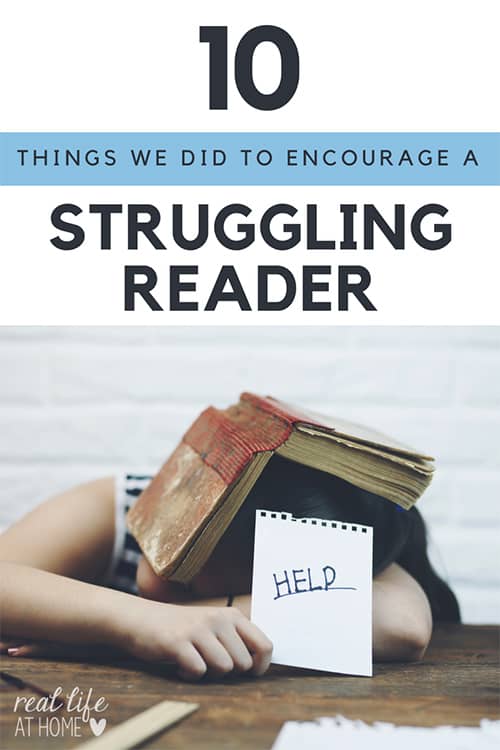
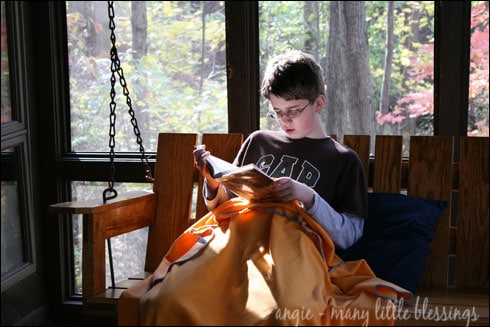
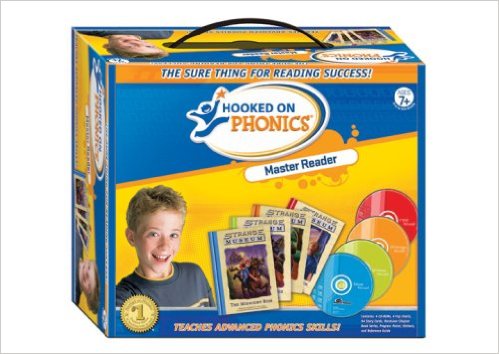
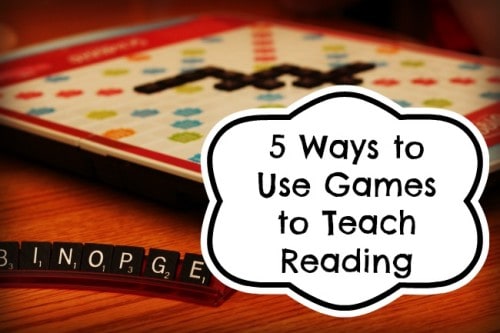
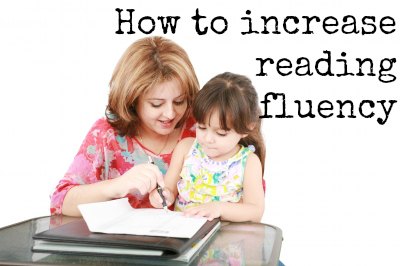
Participating for the first time . . . looks like lots of fun. (I’m also a 7 Quick Takes regular; I can’t resist a good link-up.) I also went with a book theme today.
I’m so glad that you joined in! I hope you decide to link up again next week. 🙂
My #2 is a rather reluctant reader so I try to get him interested by introducing more interactive books on the Ipad and making him read aloud nightly to me. We also leave lots of books all over the house and in the genre that he is interested in to stimulate his interest in books.
Oh yeah — the iPad is a really fabulous tool. My daughter is doing well with reading, but she also loves the interactive book apps that I have on ours.
Nice to meet you! I’ve loved being with the lovely Amanda and I know I will love the new TTT home with you as she says such wonderful things about you:)
Aww…thanks so much! 🙂
Great list! The boy I babysit is often given all sorts of books to read ranging from pokemon, to minecraft, and believe it or not, some halo chapter books. I don’t really care for the halo one’s, but he just flew through them, I was impressed that he was so into a chapter book!
-Samantha
kreativekaring.com
Great post Angie! And this can of course apply to any reader-struggling or not. Our goal is to raise our children in a print-rich environment nd hopefully, in the process, help them to develop a love for reading. Reading aloud quality literature, bit above grade level, has probably been the single most effective and important thing we have done to get our kids interested in reading independently. There’s just something about getting cught up in a story that is magical. And Chronicles of Narnia is one of our all-time favorite read alouds!
I totally agree – this whole list is great for even fabulous readers.
I have to admit — I have never read the Narnia books. Well, I have read one of them, and then we listened to one on CD. But, my husband has read them so he and Noah got to talk about the books as Noah worked his way through them.
How great for your reader that you implemented all of these tips… we are family of readers here, and I am convinced that is was because of modeling reading all the time — and all those trips to the library. I appreciated all of your tips!
I love that my kids get all excited to head to the library and find new things. It just works so well for our family that it’s an exciting outing for them and exciting for me to have the house all to myself. Plus, of course, nice for my husband that they have that special time that is just for them.
Great post! As a mom of a struggling reader and a former remedial reading teacher I have to say all these ideas are great! Thanks for sharing.
Those are all excellent suggestions for reluctant readers. And not a one is about a reward. Getting them to enjoy reading and motivated intrinsically is the best. You should be proud.
It’s so funny, I hadn’t even noticed that until you said it. Thanks for pointing that out — it made me smile. 🙂
Thanks so much for hosting Angie! Have a great Tuesday!
I love these tips, Angie! I haven’t had any experience with a reluctant reader, but I’m filing this away in case I do.
I’m going to keep this list in mind for the future. I don’t *think* my daughter will have a problem reading but who says I can start implementing some of these things now?
I think these things are all wonderful for any child, not just struggling readers. So, pick some of your favorites and try them out. 🙂
I was having difficultly in getting my son to read for a while, but I used (and continue to use) many of the tips you listed here. The turning point for Andrew as when we discovered the “Magic Tree House” series and the “Boxcar Children” series. He absolutely loves those books and motivated to practice his reading because wants to be able to read those books himself!
I’ve thought about encouraging the kids to read both of those series. I’ll have to suggest them to them again. Thanks for the reminder!
After being spoiled by our older girls, it’ll be great to have these tips for our third who I foresee being a little more…challenging in the reading department. Thank you!
As a future school counselor (to graduate next month!!), I LOVE this list–thanks for sharing! These are definitely some ideas that I have been thinking about, as I’ve worked with students who sound similar to your son.
These are great tips for any child learning how to read, or learning how to read better. What a great list!!
My son is in kindergarten, and I’m always looking for new ideas to get him inspired and motivated!
Great list! We’ve used many of these. My oldest, being a true first-born, was a reluctant reader simply because he had in mind that once he finished the phonics book we use in homeschool (Alpha-Phonics) he would be able to read anything he wanted to. When he found that wasn’t quite the case–he still needed to practice reading–he was reluctant to read even simple books. My husband questioned my sanity on this, but I brought home from the library several beginning reader joke books and left them on the coffee table. No pressure–I knew he would find them, and I knew he would be interested enough to pick up at least one of the books and start reading. It worked! After that, he was more confident in trying other (thankfully, non-joke) books. 🙂
Series were also a favorite with him–Magic Tree House, Encyclopedia Brown, the Narnia series, etc. He read the entire Hardy Boys series one summer–over 50 titles. (BTW, I would only recommend the older titles in that series.) I think the advantage to it being a series is that the major characters and setting are established and that makes it easier to follow the various story lines, which aids comprehension for new readers.
My daughter (who is our youngest) is in 1st grade. I find that she is our one who will most often get frustrated when she isn’t able to read everything. I keep trying to remind her that she is already a reader, but that she just needs to keep learning. She’s pretty stubborn. 😉
let them see the enjoyment you get from reading.
My brothers were both reluctant readers, leaving my mom crying on a neighbour’s shoulder because we were homeschooled so she was trying to teach the reading. She got my brother tested for glasses, but he just need more time to learn than I did. When Mom stopped comparing him to me (as I read quickly), and let him read at his own pace, he did great. My parents both also read to us a lot, and we made regular trips to the library. I remember books with lots of pictures (Bill Peet, Berenstain Bears) as well as later comic books like TinTin and Asterix. My brothers both love reading now, and I’d say they did by at least Grade 6 if not sooner. 🙂 Oh, and I’d say let them read wherever they find it comfortable… my brother would read laying down on our ottoman, with his book on the floor in front of him. 🙂
Excellent list! Did you listen to the Radio Theatre of Narnia or the actual audio book? I’ve never listened to the straight audio. I should tho’. I could read those over and over again!
(I sincerely meant to come over here on Tuesday and tweet a little, etc. Alas, my internet has been down since SUNDAY! *choke* And in all honesty, I forgot it was Tuesday! *wink* Looks like it was fabulous, tho’!)
We listened to the actual audio book of The Magician’s Nephew that was read by Kenneth Branagh. It was really good.
I bet it was nice after all these years to be able to forget that it was Tuesday, huh? Although no Internet? Augh!
Thanks so much for stopping by, Amanda! 🙂
My daughter who is a reluctant reader loved to read aloud to our dog.
I have heard of formal programs like that, and heard wonderful things about them. Great idea!
Thanks so much for this! I have a 10 year old in the 3rd grade in public school. He struggles with reading and language arts. He was retained in first grade which did NOTHING to help him. His teacher this year is talking retention again. I’ve decided if they retain him I’m pulling him out of public school. He’s had reading intervention every year and nothing is working. I’ve approached them about testing for LD but so far in the first and only meeting they’ve determined he isn’t “bad” enough to actually test. You know what an act of congress it takes for them to actually test a child. But some of these things I haven’t tried and I definitely will be. It’s always been hard for me to know what to do to help him. I never struggled with learning. His teachers are obviously at a loss. Knowing your son has progressed and is doing well gives me hope. Thanks again for sharing! Sorry for the long rant.
I would keep pushing to have him tested, especially since long term reading intervention hasn’t helped (my son also had a couple of years of reading intervention in school) and they are talking about retaining him a second time. Maybe you could speak to someone higher up in the school district about your concerns.
I’m glad that some of the methods that we used sound like they might be helpful. I definitely hope they will be!
I suggest finding a place that does functional vision testing. (Not just checking acuity.) There are many places online that give a symptom checklist. One of which is http://www.minnesotavisiontherapy.com/ This is the place I took my son. We are currently half-way through the program (started in November), and it has made a HUGE difference! My son hated reading before this, and now he’s the one I have to check for flashlights at bedtime.
After all I’ve done researching this (and I did a lot before making the commitment to the program), I recommend to many people that they get their child screened. Even if there isn’t a ‘big’ problem, it can really give some good insights.
Prior to this, some of my strategies for getting my son to read were finding books that weren’t too thick and that had larger print and wider spacing and that were not justified type – and preferably didn’t have distracting drawings or decorations. Those things didn’t make him love reading, but they did make him more willing to try because it felt less overwhelming.